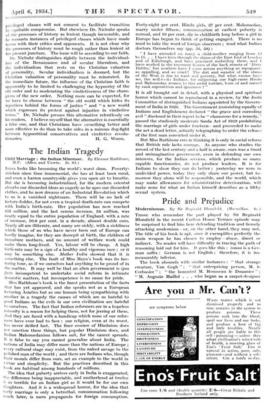The End of Our Time Reflections on the End of
an Era. By Reinhold Niebuhr. (Scribner. 10e. 6d.) Reflections on the End of an Era. By Reinhold Niebuhr. (Scribner. 10e. 6d.) WHETHER or no western civilization be in an advanced stage or decline, we are very conscious of living in an age of transition.
A definite phase or period of culture and social organization
is passing away as men become aware of what Mr. Deli* Burns calls " new horizons." Such periods are full of hope and danger, and a new world comes into being only with pain and labour. To the interpretation of the position of our Western peoples as they grope their way from the old epoch
to the new, Dr. Reinhold Niebuhr has made a notable con.
tribution in his latest book. Reflections on the End of an Era challenges comparison with Berdyaev's work, The End of
Our Time. Both writers are convinced of the breakdown of the liberalism and rationalism of the nineteenth century. Dr. Niebuhr's main thesis is the inadequacy of the liberal
culture of modernity to guide us in the urgent tasks of social reconstruction. Liberals expect too much from the appeal to reason and moral principle. That is why they are quite ineffective in dealing with vested interests and with governing classes who are clinging to power. The optimism of rationalists and liberals is really childish. Dr. Berdyaev's line of criticism is similar but more profound. He holds that we are witnessing the end of the humanism of the Renaissance. Two features of the Renaissance lie under condemnation. There is first its optimistic spirit of self-confidence and self-reliance. Man was taught by the Renaissance that he need acknowledge no power higher than himself. He would lift himself up by his own strength and wisdom. This kind of pride courts failure. There is secondly the declaration of independence by every department of human culture, which ends in a chaos of uncoordinated interests and divided selves. " Art for Art's sake " and " Business is business " have proved signposts to a culture without unity of purpose or worthy aim. Bolshevism and Fascism are both attempts to provide the kind of synthesis which the new age requires, but both operate with outworn conceptions. Fascism builds on the nineteenth-century principle of nationalism which has already brought disaster on our civilization. Bolshevism continues the tradition of secular rationalism which equally belongs to the age that is dying. Niebuhr recognizes this almost as clearly as Berdyaev. " There are indications that Communism will substitute a mechanistic collectivism for the mechanistic individualism of a bourgeois civilization. Its collectivism is mechanistic partly because it is, like capitalism, the product of a mechanical civilization and partly because it is, like liberalism, a fruit of rationalism". Berdyaev for this reason, and also because he knows the character of the Russian revolution through first-hand experience, regards Bolshevism as retrograde rather than constructive. Dr. Niebuhr finds in Communism, with all its acknowledged limitations, the essential instrument by which transition to a new era must be effected.
It is at this point that a certain vacillation or confusion of thought seems to emerge in Dr. Niebuhr's work. Optimistic humanism with a Christian or semi-Christian flavour is Dr. Niebuhr's bugbear. Over against it he extols with some justification a Christian tradition which believes in original sin, and expects catastrophic judgements in history. He sees the essential weakness of all mildly progressive religions of immanence which masquerade as Christian. He likewise insists on the part played in history by the cruder, more brutal forces of human nature. " The processes of history are too rough to make a precise discrimination between good and evil possible." We must not seek to refine these pro- cesses too much. The disinherited are the ministers of justice on a sinful world. We may try to modify their violence and vindictiveness, but we must not oppose these elemental forces, and we must not expect more than rough justice, very rough justice, to be enacted on the plane of history. So in politics, we must be rational but not too rational, moral but not too moral, religious but not too religious.
The attempt to define the necessarily indefinable point at s' rich loyalty to reason, morality and religion becomes ex- cessive produces in Dr. Niebuhr curious oscillations of judge- ment. His whole analysis depends on the judgement that privileged classes will not consent to.. facilitate transition by equitable compromise. But elsewhere Dr. Niebuhr speaks of the processes of history as lenient though inexorable, and he recounts instances of privileged classes which have made terms with their critics and, opponents. It is, not clear why the processes of history must be rough rather than lenient at the present juncture. The issue will be according to our faith.
Dr. Niebuhr distinguishes rightly between the individual- ism of the. Renaissance and of secular liberalism, and the individualism that rests on the Christian valuation of personality. Secular individualism is doomed, but the Christian valuation of personality must be reinstated. In the immediate future, the influence of the Christian faith is apparently to be limited to challenging_ the hypocrisy of the old order and to moderating the vindictiveness of the cham- pions of the new order. Nothing more can be expected, for we have to choose between " the old world which hides its injustices behind the forms of justice " and " a new world which expresses its protest against injustice in vindictive terms." Dr. Niebuhr presses this alternative relentlessly on his readers. I believe myself that the alternative is essentially a false one, and that Christians have something better and more effective to do than to take sides in a ruinous dog-fight between hypocritical conservatives and vindictive revolu-









































 Previous page
Previous page